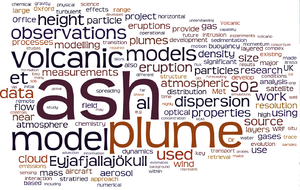VANAHEIM: Difference between revisions
(Created page with "{{Infobox grant | acronym = SHIVA | name = Spectrally High resolution Infrared measurements for the characterisation of Volcanic Ash: a new way to study volcanic processes | f...") |
|||
| (15 intermediate revisions by 4 users not shown) | |||
| Line 1: | Line 1: | ||
{{Infobox grant | {{Infobox grant | ||
| acronym = | | acronym = VANAHEIM | ||
| name = | | name = Characterisation of the Eyjafjallajökull Volcanic Plume and its Long-range Influence | ||
| funding = NERC | | funding = NERC | ||
| start = 1 | | image = [[File:VANAHEIMwordle.png|300px]] | ||
| finish = | | start = 1 October 2011 | ||
| PI= Dr Don Grainger<br>University of Oxford | | finish = 30 September 2014 | ||
| | | PI= | ||
| | | coi=Dr Don Grainger<br>University of Oxford | ||
| cois= | |||
| recogresearcher = | |||
| recogresearchers = | |||
| partner = | |||
| partners = | | partners = | ||
| researcher= | |||
| researchers = Dr Gareth Thomas<br>University of Oxford<br>Dr Dan Peters<br>University of Oxford | |||
}} | }} | ||
== | ==Characterisation of the Eyjafjallajökull Volcanic Plume and its Long-range Influence== | ||
''' | '''VANAHEIM''' is a [[NERC]] funded project to integrate the volcanological and atmospheric science methods in order to initiate a complete system model of the near-field atmospheric processes involved in the 2010 erution of Eyjafjallajökull. | ||
==Meetings== | ==Meetings== | ||
Scheduled | Scheduled VANAHEIM meetings | ||
<ul> | <ul> | ||
<li>Kick-off Meeting, Reykjavik October 2011 | |||
<li>Kick-off Meeting, | <li>Science Meeting, Leeds, Two-days during 28 February-1 March 2013 | ||
<li> | |||
</ul> | </ul> | ||
==Science== | |||
The recent volcanic eruptions in Iceland of Eyjafjallajökull and Grímsvötn have illuminated the need to improved techniques for near real time quantification and detection of ash clouds. In addition in-situ measurements of ash are needed to directly measure ash size distributions in ash clouds for accurate prediction of ash transport. | |||
Real time satellite remote sensing and optical in-situ measurements ash clouds require knowledge of the optical properties of the ashes to obtain quantitative results. Current literature on the optical properties of ash is limited particularly in the infra-red (which is essential for detecting ash at night time). | |||
As part of the VANAHEIM project we are quantifying a large number of volcanic ash clouds suspended in a test chamber. These measurements are being undertaken at the Molecular spectroscopy facility at the Rutherford Appleton laboratory. Optical measurements over wide range of wavelengths covering the ultraviolet, visible and infra-red are taken. Measurements of the suspended ash particle size are made by a number of aerosol instruments (scanning mobility particle sizer, aerodynamic particle sizer and an optical particle counter). | |||
Hugh Coe’s group at the Centre for Atmospheric Science, Manchester University has made a number of concurrent measurements during the experiments using the CAS instrument from the FAMM atmospheric research aircraft. This allows characterization of the instruments response to a number of ash plumes and thus improving the instruments ability to quantify ash plumes in any future ash events. In addition Manchester will characterization particle shape SEM filters collected during the experiments. | |||
==Publications== | ==Publications== | ||
Latest revision as of 15:18, 1 March 2013
Characterisation of the Eyjafjallajökull Volcanic Plume and its Long-range Influence
VANAHEIM is a NERC funded project to integrate the volcanological and atmospheric science methods in order to initiate a complete system model of the near-field atmospheric processes involved in the 2010 erution of Eyjafjallajökull.
Meetings
Scheduled VANAHEIM meetings
- Kick-off Meeting, Reykjavik October 2011
- Science Meeting, Leeds, Two-days during 28 February-1 March 2013
Science
The recent volcanic eruptions in Iceland of Eyjafjallajökull and Grímsvötn have illuminated the need to improved techniques for near real time quantification and detection of ash clouds. In addition in-situ measurements of ash are needed to directly measure ash size distributions in ash clouds for accurate prediction of ash transport.
Real time satellite remote sensing and optical in-situ measurements ash clouds require knowledge of the optical properties of the ashes to obtain quantitative results. Current literature on the optical properties of ash is limited particularly in the infra-red (which is essential for detecting ash at night time).
As part of the VANAHEIM project we are quantifying a large number of volcanic ash clouds suspended in a test chamber. These measurements are being undertaken at the Molecular spectroscopy facility at the Rutherford Appleton laboratory. Optical measurements over wide range of wavelengths covering the ultraviolet, visible and infra-red are taken. Measurements of the suspended ash particle size are made by a number of aerosol instruments (scanning mobility particle sizer, aerodynamic particle sizer and an optical particle counter).
Hugh Coe’s group at the Centre for Atmospheric Science, Manchester University has made a number of concurrent measurements during the experiments using the CAS instrument from the FAMM atmospheric research aircraft. This allows characterization of the instruments response to a number of ash plumes and thus improving the instruments ability to quantify ash plumes in any future ash events. In addition Manchester will characterization particle shape SEM filters collected during the experiments.
